Cheryl Wilfong is a Master Gardener—with 32 different gardens(!)—and a Buddhist meditation teacher at Vermont Insight Meditation Center. She combines these two callings in an award-winning blog (you can find it at www.themeditativegardener.blogspot.com).
Her book, Garden Wisdom 365 Days a Year, shares the best of her blog, a year’s worth of warm, wonderful, and wise lessons. Here’s a selection of her Winter entries.
December 5
Frosty Leeks
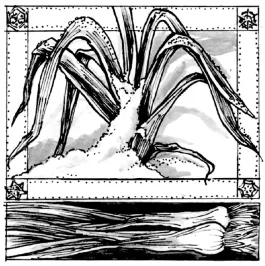
Yesterday morning, I walked out to the vegetable garden and dug up the leeks. The crusty snow had insulated the ground before temperatures plummeted. Now I have a handful of leeks safe and sound in the refrigerator instead of locked in the embrace of frozen Mother Earth. (Temperatures were supposed to hit the single digits this morning.)
Before our unskillful thoughts and actions “freeze” into bad habits, let’s dig them out. Oh, it’s not easy, trudging through our inner landscape, which can feel bleak.
The sassy comeback can feel so good. Practice biting your tongue. This may lead to less regret. The quick defensive response to blame just hurls a hot potato back at the person who threw it at you. Practice holding the hot potato. (Ouch! That hurts.) Practice dropping it.
Keep digging around those unskillful thoughts and actions. Eventually, the ground won’t be frozen. And neither will you.
December 6
Last Chance
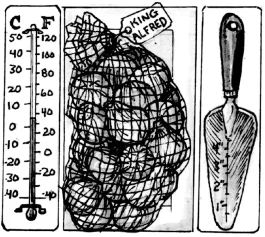
Quick! The ground has thawed for a minute. That is, if the ground is in the sun. If it’s in the shade, the earth is still frozen solid.
It’s your last chance, your last chance to plant those spring bulbs that have been dilly-dallying by the back door.
We usually don’t know when we’re being presented with our last chance—our last chance to see a friend who drops dead a week later, our last chance to say “I love you” to an aging relative, our last chance to hug an acquaintance who then moves across the country.
Life is precious. This very life is precious. Taking life for granted is a form of ingratitude. Taking it for granted that things will continue as they have been is short-sighted, and sometimes leads to regret. “If only I’d known. If only I’d…”
We can’t know the future. We can’t expect the future to be the same as the past. Nor can we expect things to continue as they always have.
Life is full of surprises. Surprise yourself and appreciate this day, this person beside you, this last chance to plant daffodils.
January 1
Happy New Moment!

Today we celebrate the new year. We turn over a new leaf, post a new calendar on the wall, open a new diary. We choose one moment and celebrate the change of a number. Last year we called the present moment by one number, say, 2017; now we call it a different number, say, 2018. It’s still the present moment.
We are never anywhere other than in the present moment. The past is a memory, a thought. It is just a thought. The future is a dream, another thought. Because, really, it is always Now.
The body ages, and, as long as the mind keeps track of time (very useful for celebrating birthdays and new years, for instance), we are caught in a cycle of birth, aging, and death.
Take my hand and step outside the whole meshugas with me now, into the Now, where there is no birth, and there is no death.
Happy New Now.
January 8
Making a List and Checking It Twice
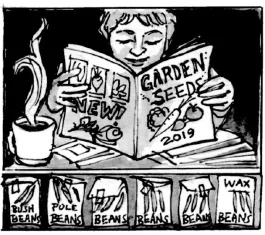
It’s January. It’s cold. It’s icy. It snowed last night. It’s a good time to curl up with a seed catalog, or a stack of seed catalogs, and dream of spring.
But before I go too far, I need to check my inventory. Don’t I already have ten half-used packets of bean seeds?
Last summer, I organized my seed packets by month—March (start indoors), April (the cold-resistant seeds that can be sown directly into the ground), and May (the tender crops and annual flowers). The seed catalogs beckon seductively. Yes! I want…I want….
This is a great opportunity to notice how desire feels in the body. Notice the tricks that desire plays on the mind.
Checking my inventory? How boring (unpleasant). I don’t want to go down to the cool, dark basement (unpleasant). I don’t want to make a list (unpleasant). I don’t want to think too hard and figure it out (unpleasant).
Can’t I just open the beautiful catalogs (pleasant) and buy whatever my little heart desires?
February 1
Air Quality in the Home
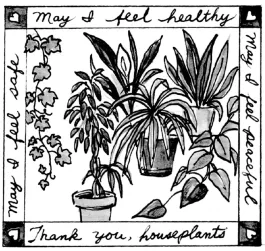
Houseplants improve our indoor air quality. During these winter days, when our windows and doors are closed tight, it’s good to know that we can get fresh air from our houseplants. Philodendron, dracaena, spider plant, English ivy, ficus, and peace lily are particularly good at convert-ing toxins from household cleaners and polyurethaned floors.
For the average house (under 2,000 square feet), we need at least fifteen houseplants. Do we gardeners need any better excuse for our indoor gardening?
How about improving the quality of our inner air? Particularly the air time that our mind gives to various dissatisfactions—at work or home—including with that irritating neighbor.
Plant some loving-kindness in your mind right now. Begin with your self.
May I feel safe. May I feel happy. May I feel healthy. (Thank you, my dear houseplants.) May I feel peaceful.
Send loving-kindness to your nearest and dearest (even if they have four legs).
And yes, send loving-kindness to that difficult person. There’s the distinct possibility that you will feel neither loving nor kind. That’s okay. This is a practice, and we are practicing.
Go ahead. Improve your inner air quality right now.
February 7
More. More. More.
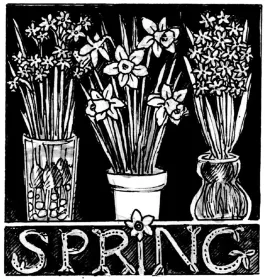
Okay. Okay. I have twenty hyacinths that are blooming or about to bloom, but when I went into the farm and garden store for birdseed, there, at the checkout, was a pot of little daffodils for $3.99. An impulse buy.
I brought them home and put them—where? Next to the paper-white narcissus. More is better. Right?
More hyacinths: I have five in bloom today and fifteen that will bloom—soon.
I need more flowers. At least that’s what it feels like.
Just yesterday, I was singing the praises of one. Just one. Just a single hyacinth. Then craving struck. And I wanted more. More. More.
What am I hungry for? What am I really hungry for?
Spring.
February 18
Tapping into Happiness
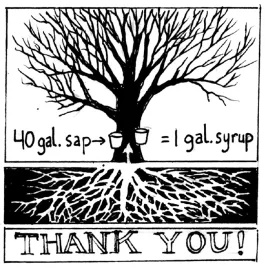
With daytime temperatures above freezing and nighttime temperatures below freezing, the sap is starting to run. It’s time to tap the sugar maples.
My spiritual friend, Vera, has tapped 22 trees in her yard this month. My farmer-neighbor taps 147 trees on my property, and thousands more on his own. Forty gallons of sap boil down to produce one luscious golden gallon of maple syrup.
Sometimes, it takes forty years of life for us to dare to distill ourselves into the person we want to be.
My life began anew at forty, when I followed my bliss and wrote my first book. For my friend Trudy, life began at sixty, when she left an abusive marriage.
Do we just let dissatisfaction boil our lives away? How do we finally tap into sweet happiness?
There are two kinds of happiness:
- Surface Happiness—when we get what we think we want, and
- the Deep Happiness of contentment with life, regardless of our outer circumstances.
A first step to finding deep happiness is to practice gratitude every day. Notice, really notice the people, things, and situations in your life for which you are truly grateful.
Sweet. ❖
Reprinted with permission of the author from Garden Wisdom: 365 Days by Cheryl Wilfong, copyright ©2017 by Cheryl Wilfong. (To order, see p.75.)



